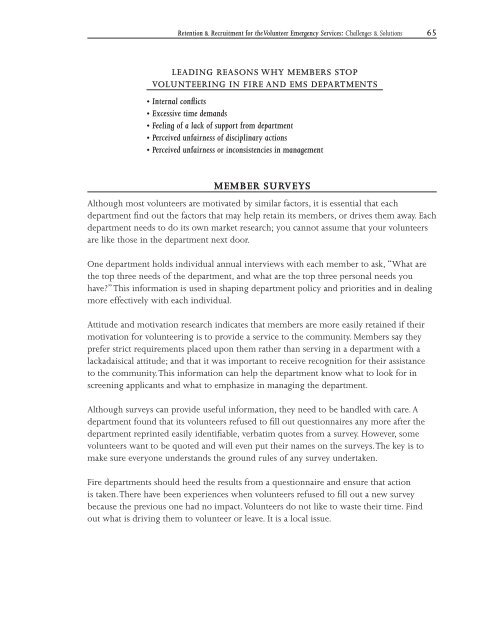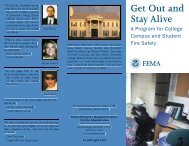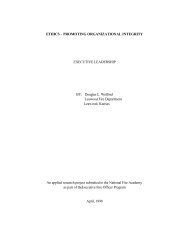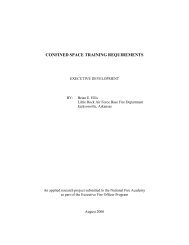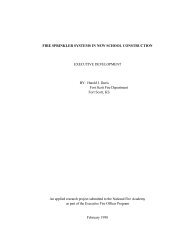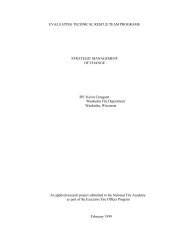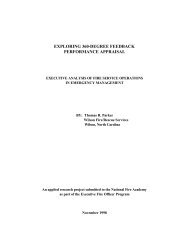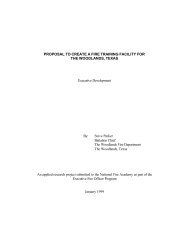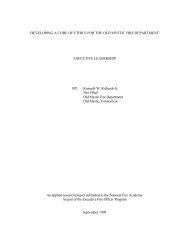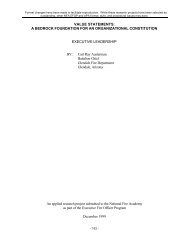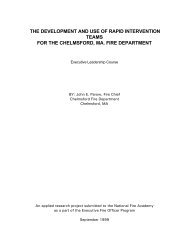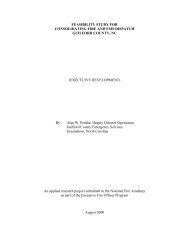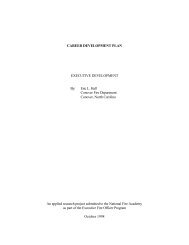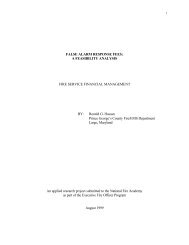Retention and Recruitment for the Volunteer Emergency Services
Retention and Recruitment for the Volunteer Emergency Services
Retention and Recruitment for the Volunteer Emergency Services
Create successful ePaper yourself
Turn your PDF publications into a flip-book with our unique Google optimized e-Paper software.
<strong>Retention</strong> & <strong>Recruitment</strong> <strong>for</strong> <strong>the</strong> <strong>Volunteer</strong> <strong>Emergency</strong> <strong>Services</strong>: Challenges & Solutions 5<br />
LEADINg REASONS WHy MEMBERS STOP<br />
VOLuNTEERINg IN FIRE AND EMS DEPARTMENTS<br />
• Internal conflicts<br />
• Excessive time dem<strong>and</strong>s<br />
• Feeling of a lack of support from department<br />
• Perceived unfairness of disciplinary actions<br />
• Perceived unfairness or inconsistencies in management<br />
member surVeYs<br />
Although most volunteers are motivated by similar factors, it is essential that each<br />
department find out <strong>the</strong> factors that may help retain its members, or drives <strong>the</strong>m away. Each<br />
department needs to do its own market research; you cannot assume that your volunteers<br />
are like those in <strong>the</strong> department next door.<br />
One department holds individual annual interviews with each member to ask, “What are<br />
<strong>the</strong> top three needs of <strong>the</strong> department, <strong>and</strong> what are <strong>the</strong> top three personal needs you<br />
have?” This in<strong>for</strong>mation is used in shaping department policy <strong>and</strong> priorities <strong>and</strong> in dealing<br />
more effectively with each individual.<br />
Attitude <strong>and</strong> motivation research indicates that members are more easily retained if <strong>the</strong>ir<br />
motivation <strong>for</strong> volunteering is to provide a service to <strong>the</strong> community. Members say <strong>the</strong>y<br />
prefer strict requirements placed upon <strong>the</strong>m ra<strong>the</strong>r than serving in a department with a<br />
lackadaisical attitude; <strong>and</strong> that it was important to receive recognition <strong>for</strong> <strong>the</strong>ir assistance<br />
to <strong>the</strong> community. This in<strong>for</strong>mation can help <strong>the</strong> department know what to look <strong>for</strong> in<br />
screening applicants <strong>and</strong> what to emphasize in managing <strong>the</strong> department.<br />
Although surveys can provide useful in<strong>for</strong>mation, <strong>the</strong>y need to be h<strong>and</strong>led with care. A<br />
department found that its volunteers refused to fill out questionnaires any more after <strong>the</strong><br />
department reprinted easily identifiable, verbatim quotes from a survey. However, some<br />
volunteers want to be quoted <strong>and</strong> will even put <strong>the</strong>ir names on <strong>the</strong> surveys. The key is to<br />
make sure everyone underst<strong>and</strong>s <strong>the</strong> ground rules of any survey undertaken.<br />
Fire departments should heed <strong>the</strong> results from a questionnaire <strong>and</strong> ensure that action<br />
is taken. There have been experiences when volunteers refused to fill out a new survey<br />
because <strong>the</strong> previous one had no impact. <strong>Volunteer</strong>s do not like to waste <strong>the</strong>ir time. Find<br />
out what is driving <strong>the</strong>m to volunteer or leave. It is a local issue.


